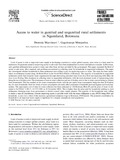| dc.contributor.author | Mazvimavi, D. | |
| dc.contributor.author | Mmopelwa, G. | |
| dc.date.accessioned | 2013-12-06T11:48:41Z | |
| dc.date.available | 2013-12-06T11:48:41Z | |
| dc.date.issued | 2006 | |
| dc.identifier.citation | Mazvimavi, D. & Mmopelwa, G. (2006) Access to water in gazetted and ungazetted rural settlements in Ngamiland, Botswana. Physics and Chemistry of the Earth, vol. pp. 31, no. 15-16, pp 713-722. | en_US |
| dc.identifier.issn | 1474-7065 | |
| dc.identifier.uri | http://hdl.handle.net/10311/1194 | |
| dc.description.abstract | Lack of access to safe or improved water supply in developing countries is a major global concern, since water is a basic need for sustenance. Programmes aimed at improving access to safe water have been implemented in several sub-Saharan countries. In Botswana, only gazetted settlements have access to water and other basic services provided by the government. This paper examined the level of access to safe water, effort required, and problems encountered in collecting water by households in ungazetted settlements. The paper also investigated whether households in these settlements were willing to pay for improving access to water. The study has been undertaken on settlements located along the Boteti River in the North West District of Botswana. The majority of households in ungazetted settlements satisfy their domestic water requirements through abstracting untreated water from river flows and hand-dug wells when the river is not flowing. Men dominate in collecting water in ungazetted settlements, with the most dominant mode of transporting water being the use of donkey carts. The dominance of men in water collection and use of donkey carts is due to water sources being too distant from homesteads. This has resulted in low water consumption levels, with the per capita water consumption being less than 20 l/capita/day for most households. Such low levels of water consumption adversely affect attainment of desirable personal hygiene and food preparation. The opportunity cost of time for water collection has been estimated at 1.80 Botswana Pula (P) and the price of water is estimated to be P18/m3 (1.00 P = 0.1755 USD on 18 November 2005). This is higher than the price paid by households residing in rural settlements obtaining water from government or district council water supply schemes. The majority of the households were willing to make a once-off contribution towards improving access to potable water with the mean willingness to pay (WTP) being P161 per household, or just over a third of the statutory agricultural minimum wage in Botswana, P589/month. The potential contribution by household to an improved water supply is significant for a largely unemployed rural population. | en_US |
| dc.language.iso | en | en_US |
| dc.publisher | Elservier, www.elsevier.com | en_US |
| dc.subject | Access to water | en_US |
| dc.subject | Ungazetted rural settlements | en_US |
| dc.subject | Portable water | en_US |
| dc.title | Access to water in gazetted and ungazetted rural settlements in Ngamiland, Botswana | en_US |
| dc.type | Published Article | en_US |
| dc.link | http://www.sciencedirect.com/science/article/pii/S1474706506001409 | en_US |

